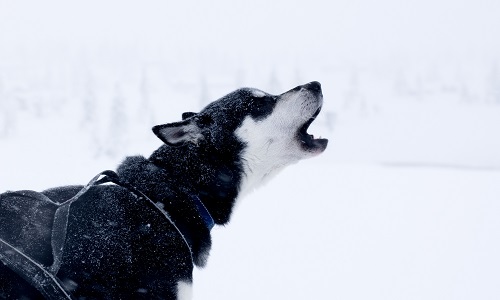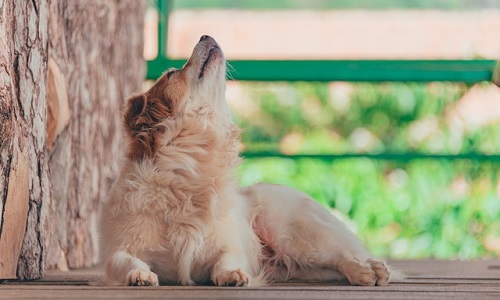It’s a recurring motif that all good horror movies incorporate: a spooky night, a cast of jumpy characters, and suddenly the unmistakable howl of a wolf cuts in from afar.
From wolves to coyotes to domestic dogs, howling is one of the most recognizable features of the canidae family, and it endures – whether it’s a large pack of wild wolves in the arctic to tiny toy breeds in suburbia, most animals in the canine family are known to howl. No matter what the breed or provenance, they’re all known to sit on their haunches, tilt their head back, and let the world know they’re there with that long, piercing “awooo!” we know so well.
The howl may be fearsome, issuing from a pack of wolves in a dark forest, or it may be sweet, coming from a tiny puppy just finding their voice. No matter the volume or size, however, the sound brings out a question in nearly all dog enthusiasts – why do dogs howl, anyway?
The Audible Swiss Army Knife: Understanding Howling & Canine Communication
 Dogs and wolves come from the same genetics, so the domestic dog’s wild cousins are the best place to look for answers. In nature, wolves use howls to communicate in a variety of ways – they face long distances and rough, thick terrain that most domesticated dogs would never encounter, so they need a good way to stay in touch. Howls serve to:
Dogs and wolves come from the same genetics, so the domestic dog’s wild cousins are the best place to look for answers. In nature, wolves use howls to communicate in a variety of ways – they face long distances and rough, thick terrain that most domesticated dogs would never encounter, so they need a good way to stay in touch. Howls serve to:
Locate lost or “misplaced” pack mates over long distances
With a piercing sound that can travel as far as ten miles over open tundra, a wolf’s howl works like an audible GPS for finding fellow pack mates – a particularly useful skill if a predator or bad weather threatens the pack. Think of it as the canine version of Marco Polo – a way to broadcast one’s position even if a flare gun and opposable thumbs aren’t available.
Signal availability to potential nearby mates
A dog’s howl is distinctive among animals, and during mating season, it may serve to let eligible bachelors or bachelorettes know that the pup in question is looking for love.
Express loneliness or stress
We may yell or cry if we get particularly upset, and dogs with anxiety do as well – they just howl or whimper rather than shedding tears. Dog owners with particularly loving dogs may notice howls beginning the moment the dog is crated or placed in another room. These sounds are a way of telling pet parents, “Hey, it’s lonely in here and I would much rather be in there with you!”
Other dogs are doing it
While it’s true that the cry of “lone wolves” is distinctive, dog parents that have witnessed a pack howl know that there’s definitely some peer pressure at play! When one dog howls near another, provided the dogs get along well, howling together seems to be something of a bonding experience among canines – an audible show of force that says, “Hey, listen to how big and tough my pack is – there’s lots of us here!” Some entertaining videos on the internet show that a well-pitched owner can trigger their dogs to howl along with them, and that some dogs can even be triggered to howl by playing audio files of wolves howling through a computer or phone.
There’s a loud sound nearby
Ever wondered why do dogs howl at sirens? Well, another surefire way to get dogs howling is to drive a firetruck or ambulance through the neighborhood with the sirens on. It’s thought that the particular pitch and drawn-out sound of the siren is similar enough to wolf howls that dogs feel that community spirit and want to lend their own voices to the cause. This can be endearing during the day, but can also cause pet parents to lose sleep if their dog feels compelled to join the chorus after dark.
How Do I Stop My Dog from Howling?
While the occasional howl might be interesting or cute, it’s a lot like barking – pet parents’ nerves can start fraying when it goes on for too long. Additionally, in suburban areas, apartment buildings, and condos, repeated howling from your dog can cause legal issues like noise complaints and citations. Because howling is often caused by separation anxiety in domestic dogs, it can also be a lot louder and longer than you imagine it to be. That means that if you’re away from the home, it’s your neighbors that are forced to listen to your dog, not you!
If your dog has a problem with constant howling, chances are there are some behavioral, schedule, or environmental changes you’ll have to make to solve the issue. Dogs don’t typically howl “just because” – there’s something that’s causing them to let out that familiar, very audible sound and, thankfully, you can probably fix it. Below, a Q & A section to address some commonly-asked questions for pet parents:
Q: Is your dog often alone?
A: Despite that persistent lone wolf stereotype, dogs are pack animals and enjoy company more than solitude. If your job or schedule keeps you away from home or your dog often, consider getting him some company in the form of a dog walker, a “puppy play date”, adopting another dog that they get along with, or finding a family member willing to dog sit on your later nights at work. They need companionship, and if you aren’t able to provide it with regularity, there’s no shame in looking for a bit of help.
 Even though it seems counter-intuitive, also make sure you aren’t making a big deal about leaving for the day or coming back home. Dog expert Cesar Milan explains that this conditions your dog to think that your departure or return is a big deal, which triggers boredom in your absence and hyperactivity on your return – both big triggers for howling. Instead, calmly leave and enter the home, and don’t pay special attention or give special treats. This will reassure your dog that your schedule is simply a routine and there’s nothing to worry over or get hyper about.
Even though it seems counter-intuitive, also make sure you aren’t making a big deal about leaving for the day or coming back home. Dog expert Cesar Milan explains that this conditions your dog to think that your departure or return is a big deal, which triggers boredom in your absence and hyperactivity on your return – both big triggers for howling. Instead, calmly leave and enter the home, and don’t pay special attention or give special treats. This will reassure your dog that your schedule is simply a routine and there’s nothing to worry over or get hyper about.
Q: Does your dog have any distractions?
A: Most humans would go a little stir crazy if they were placed in a room and left for eight hours or more without television, books, internet, or a smartphone to hold their attention. Dogs, however, are routinely left to amuse themselves without anything to hunt or play with.
Dog toys are a great solution, but complex, interesting toys geared towards your dog are an even better choice. Here are a few suggestions to keep in mind when considering creating toy options for Fido:
- Embed treats, globs of peanut butter, or small toys in an ice mold for your dog to slowly reveal over the course of the day. (If you don’t have a specific ice mold, a shallow bowl of water placed in the freezer works just as well – just make sure to leave enough time for it to freeze solid.)
- If your dog is a “chewer,” get “tough” toys they need to shred, such as ones made from super-tough cloth with rope-style legs. Some tough toys even feature a smaller squeaky toy inside to give your dog incentive to explore.
- Need a variety of toys but don’t have time to get to the pet store? There are a variety of monthly subscription boxes packed with dog toys to give your four-footed companion plenty of interesting choices throughout the month.
- Leaving a radio or television on will provide him with environmental stimulation and help with separation. Try leaving a worn, unwashed t-shirt in his sleeping area to cuddle with as well: it will remind him of you and help him relax.
- Interesting app-powered accessories like a two-way video chat module that shoots dog treats on command can also help your dog (and you!) with separation anxiety.
Q: Does your dog have a positive environment?
A: If your dog is under a lot of stress – grabby children pulling on his ears, bad-tempered pets attacking and fighting with him, a constantly-changing environment with new sounds and smells – he may be literally howling for relief. While it’s difficult to give a dog everything they need in some situations, even a thoughtful touch like a muffling blanket over their sleeping crate can offer a break from overstimulation.
If your dog is exhibiting fear-based body language like pinned-back ears, a crouched posture, or a tucked tail, he needs a place where he can escape and feel safe. Make sure he has it, and chances are the howling behaviors will start diminishing. Crate training a dog is an excellent way to give them a safe space without needing to lose an entire room as a “do not disturb” zone.
Q: Does your dog have a clean bill of health?
A: Though it’s rarer than separation anxiety or community howling, some dogs howl because they are injured or sick. They’re trying to get your attention to let you know, “Hey, mom/dad, something’s wrong and I need your help!” This is more likely if your dog has suddenly started howling when nothing’s changed in his environment, and it’s a red flag that he may need a vet visit.
Use these questions to help determine if your dog’s howling is due to a medical issue, and when in doubt, book a vet appointment for a checkup:
- Has your dog’s hunger increased or decreased a great deal recently?
- Is he limping or moving in an odd way?
- Does he seem angry or defensive if you touch a certain place on his body?
- Has your dog been in a fight with another dog or animal?
- Are they coughing, sneezing, drooling, or panting more than usual?
If the answer to any of these questions is “yes” and your dog has recently begun to howl, there’s a good chance he has an injury you either can’t see or haven’t noticed yet. Getting them medical attention (and relief) may help stop the howling behavior.
Q: Is there a new dog in the neighborhood?
A: Dogs are curious creatures, and a new dog on the block could be cause for concern. Remember, you are in your dog’s pack and he wants to protect you, so howling could be his way of saying, “This is my territory, so stay away from my pack!” This is particularly likely if he’s howling in response to another dog’s barking or howling nearby, especially at night.
 You can help alleviate your dog’s anxiety over territory by walking him along the borders of the yard or property and allowing him to mark trees, fences, and posts with urine. If possible, and if the new dog and your dog are friendly, vaccinated, and the dogs are spayed/neutered, you can also approach the new dog’s owner to ask if they can meet. If your dog sees the new dog and has a chance to examine their scent, they may feel less insecure about their presence in the neighborhood.
You can help alleviate your dog’s anxiety over territory by walking him along the borders of the yard or property and allowing him to mark trees, fences, and posts with urine. If possible, and if the new dog and your dog are friendly, vaccinated, and the dogs are spayed/neutered, you can also approach the new dog’s owner to ask if they can meet. If your dog sees the new dog and has a chance to examine their scent, they may feel less insecure about their presence in the neighborhood.
If your neighborhood has a dog park, a quick visit will also help your dog get to know which dogs are present in their territory, and take some of the unknown element out of their howling concerns.
Q: Does your dog have all of their basic needs?
A: It may seem straightforward, but dogs sometimes howl if they need something and aren’t getting it. Your dog should be groomed regularly to keep fleas and canine parasites at bay, have nourishing food available whenever they’re hungry, and always have access to clean water when they’re thirsty.
Bedding should also be kept clean and washed regularly – dogs may bury or hide urine or feces under a blanket or in a crate, so you’ll need to check often. You wouldn’t want to sleep on a dirty bed, after all, and your canine companion doesn’t either. Howling may be their way of saying that they need your love, care, and opposable thumbs to fix a problem in their environment.
Summary
Howling is an interesting method of canine communication that covers a lot of bases, so if your dog is howling too much, make sure you’re listening. Correction, rather than punishment, is the fastest and most enduring route to stopping your pup from howling when you don’t want them to.
Sources:
- “Wolf Reproduction Biology and Maturation.” Western Wildlife.org, (no publish date), http://westernwildlife.org/gray-wolf-outreach-project/biology-behavior-4/. Accessed December 28, 2018.
- “Howling in Dogs.” Pets.WebMD.com, (no publish date), https://pets.webmd.com/dogs/guide/howling-dogs#1. Accessed December 28, 2018.
- Millan, Cesar. “3 keys to stop the barking.” Cesar’s Way.com, (no publish date), https://www.cesarsway.com/dog-behavior/barking-and-howling/three-keys-to-stop-the-barking. Accessed December 28, 2018.




